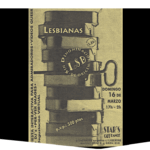What does it mean to be a man today? With Né pour être viril, Romain Delhoux and Karim Dumoulin deliver a story that is both deeply personal and strikingly universal. This solo performance — blending theatre, dance, and autobiography — explores the tensions, wounds, and beauty in the making of masculinity, in a world where “being a man” often remains a heavy norm, even within queer communities.
The show opens in a locker room — a setting heavy with symbolism. “The locker room felt loaded with masculine tension,” Karim explains. “It reminds you of Rocky, of pushing yourself to the limit, of sweat, of competition between bodies. It’s a paradoxical place — about showing off and hiding at the same time. And let’s be honest, all these muscled guys in one room — there’s something inherently homoerotic about it!” From this charged starting point, the performance unfolds.
Inspired by his own life experiences, Romain brings to life a search for identity that breaks out of traditional boxes. “Karim created a safe, caring space for me to work,” he shares. “His input helped me balance my story — making it personal, but still relatable to others.” Together, they built the text hand-in-hand, carefully avoiding the trap of making it just a therapeutic confession. “We wanted intimacy, but not self-indulgence,” Karim points out.
Né pour être viril also refuses to fall into tragedy. Rather than following a classic “trauma-to-survival” narrative, the show charts a path of resilience. “Too many queer stories end in disaster or only frame the character as a survivor,” says Karim. “We wanted to show that beyond violence or confusion, there is the possibility of building a stable, loving life.”
The performance weaves violence, tenderness, and love — not in a strict timeline, but thematically. “We didn’t want a story that spirals into despair,” Romain explains. “The progression moves from harsh beginnings toward moments of softness and hope.”
Although rooted in Romain’s own experiences, the story resonates widely. “I’m touched when people from completely different backgrounds tell me they see themselves in this journey,” he shares. Because beyond coming out, Né pour être viril questions masculinity itself. “Whether you’re in a straight or queer world, masculinity is always being policed,” Karim says. “You’re never ‘man enough’, or you’re ‘too feminine’ — but what does that even mean? Maybe it’s about elegance, about taste, about how you move through the world.”
This exploration of fluid masculinity is amplified through the show’s dance and movement. “Dance helps me express what words cannot,” Romain explains. Each dance sequence deepens the emotion, adding a layer of poetry. “Dance lets the body explore the space between masculine and feminine, strength and softness,” says Karim. “It also gives the audience room to breathe and reflect.“
From the start, Romain and Karim envisioned a performance that would be accessible, traveling beyond elite stages. “We wanted to bring this story to people — whether in Brussels, or in the smallest cultural center in Wallonia,” says Romain. Né pour être viril is meant for everyone.
That’s why the next performance, on May 13 at the Centre Bruegel in Brussels, feels especially important. Organized by Visite Particulière asbl, and with the support of Pride Brussels, the ticket price is lowered to €12, making the event more accessible to all.

“Né pour être viril speaks about our vulnerabilities, our strengths, and how we build ourselves between the two,” Karim concludes. “And that conversation — it belongs to everyone.“
Don’t miss this powerful invitation to rethink masculinity — a performance that reminds us that being a man isn’t about fitting into a mold, but about forging a path that’s personal, vibrant, and deeply human.
You may also like
-

DAY-4 – Celebrating Villainous Characters: Reclaiming Power at “The Succubi Fair”
In recent years, witches have become icons of empowerment, embraced by feminist movements as symbols
-

2025 Global and European Pride Calendar: Key Dates and Destinations
Pride celebrations in 2025 promise a vibrant display of unity, diversity, and activism across Europe
-

Sweden’s Eurovision 2025 Entry: KAJ and the Sauna Revolution
Sweden, long known for slick pop and polished choreography at Eurovision, has thrown its rulebook
-

Guinguettes Barc: Where Brussels Parks Get Their Groove (and Their Greens) On!
Launched in 2017 by Brussels Environment, the Guinguettes Barc are seasonal open-air bars and community
-

Queering the Archive: Fefa Vila and Castillo on Chance, Memory, and Radical Pedagogy
On May 13, 2025, as Brussels begins to hum with Pride energy, a quieter, deeper

